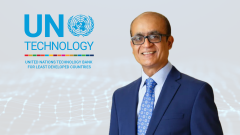- عربي
- 中文
- English
- Français
- Русский
- Español
Statement Regarding the Impact of COVID-19 on Vulnerable Countries
Statement by Ms. Fekitamoeloa Katoa‘Utoikamanu, High Representative for the Least Developed Countries, Landlocked Developing Countries and Small Island Developing States
2 April 2020
New York, USA
My thoughts and best wishes are with all of you.
A tsunami called COVID-19 is hitting us. We are in the throes of a virus that knows no borders, and travels on land and sea at lightning speeds.
The disruption and the suffering are everywhere. And for now, we live with them everywhere.
Yet, there are differences in how we endure the disruptions and live in the aftermath. Do we have access to food, to health care, to medicines, to safe water supply, security and means to communicate with our families and loved ones?
The sad fact is that once more, over one billion people, human beings of the world’s most vulnerable countries – the least developed countries, the landlocked developing countries and the small island developing states – may suffer most from a massive outbreak and its aftermath.
We must act now and fast.
Right now, this is primarily a health emergency. But the devastating social and economic crisis that will come over the months and years already looms.
Projections by the United Nations Development Programme are that income losses as a result of COVID-19 are expected to exceed $220 billion in developing countries. Under-staffed hospitals and fragile health systems are likely to be pushed to the brink and beyond.
How can you wash your hands for twenty seconds when in many cases, up to 75 per cent of people in least developed countries lack access to soap and water? How do you confine yourself at home when you do not have one?
OHRLLS will continue to be a strong partner for the least developed, landlocked and small island developing states during and after this most unprecedented global challenge of the 21st century.
We have stepped up our advocacy for them at the highest levels. We are organising a series of virtual briefings, in which the Deputy Secretary-General of the United Nations, Amina Mohammed, will dialogue with representatives of each group of countries we work with – Least Developed, Landlocked and Small Islands.
The purpose is to update them on the global response and to share the specifics of the UN’s activities to support these countries. At the same time, we will step up advocacy for a global response to be implemented in a unified way that respects the unique needs of the countries we work with.
For example, for landlocked developing countries, with no direct access to seaports, we must ensure that cross-border logistics flows are kept open, giving priority to essential goods like medical supplies and food.
We cannot disregard the tragic impact this crisis is having on more developed nations and their peoples. We are all in this together and we must do everything to avoid a truly devastating global tragedy, in the days, weeks and months ahead.
It will be critical that the multilateral system and developed countries urgently support vulnerable countries to strengthen their health systems and their capacity to halt transmission. As the unfolding events show, we are in an ever more interconnected world, and we are only as strong as the weakest health system amongst us.
The United Nations system through its global network of regional, sub-regional and country offices is supporting all governments and partners through the response and recovery of this crisis.
The United Nations Secretary-General has established a dedicated COVID-19 Response and Recovery Fund to complement efforts in low and middle-income countries to address the socio-economic impact of the COVID-19 crisis.
As we face this threat, we need a response that is driven by ambition, innovation and compassion. In the words of the Secretary-General: “COVID19 is menacing the whole of humanity – and so the whole of humanity must fight back.”
We are in this together. Let us overcome it together.





